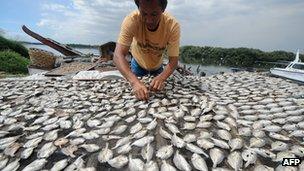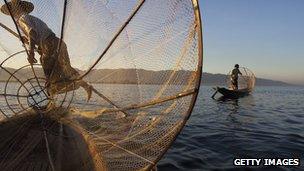Regulation key to save fish stocks
- Published

The amount of fish being caught has declined in the past few years
It is four in the morning and the Jurong Fishery Port is buzzing with activity.
Boxes of various varieties of fish are being unloaded here at Singapore's largest wholesale fish market.
Workers are busy cleaning and displaying their stock and traders are negotiating hard with perspective buyers.
There is also the occasional high-pitched cry about "the cheapest rate" from over-zealous staff at some of the stalls.
On the surface, it looks like business as usual, but dig a little deeper and the picture starts to change.
James Chng, 68, has been involved in the fish trade since 1969. During that time, he has seen a steady decline in the industry.
"The volume is down by almost 70% compared with the 1980s," he says.
He says his firm, Keck Seng Brothers Fishery, is handling just 500 kilos of fish per day, down from 20 tonnes during the peak years in the 1980s.
And he does not expect the situation to improve. In fact, he says he might just retire soon.
'Coming down'
Mr Chng's case is not an isolated one.
The amount of fish being caught has been declining globally for years.
"If you add the weight of all the fish caught by vessels all over the world, we are coming down from the peak we saw in the late 1980s," says Andrew Sharpless, chief executive of Oceana, an international conservation organisation.
Over-fishing is the main reason, he says.
Over-fishing, which is also referred to as over-exploitation, occurs when the amount of fish being caught exceeds that being reproduced, increasing the risk of depletion of stock or in the worst case a complete collapse.
The issue is one of the biggest challenges facing the industry.
According to the United Nations Food and Agricultural Organization (FAO), some 77% of the world's fisheries are either fully-exploited, over-exploited, depleted or recovering from depletion.
The FAO defines a fishery as fully-exploited when it "is operating at or close to an optimal yield level, with no expected room for further expansion".
Mr Sharpless warns that the problem needs immediate attention.
"The ocean is like a bank account," he explains. "You need to put more in than you take out.
"You can live off the interest income, but if you start digging into and depleting your capital, then no one can help you."
Sustainable fishing
While the issue is becoming a major problem, the solution, according to policymakers and industry analysts, is very simple.
Countries need to implement some basic measures to ensure better control of the industry, they say.

Regulating small scale fishermen is key to achieving sustainability in the sector
Olafur Ragnar Grimson, the president of Iceland, has suggested that all fishing vessels should be fitted with automatic tracking devices.
"They send signals to satellites or other receivers, enabling authorities to monitor where each vessel is at all times," he said in a speech at the World Ocean Summit being held in Singapore.
Fish caught all across the globe should be bar-coded to indicate where it has been caught and the vessel that caught it, to help track the amount of fishing being carried out by various vessels, he suggested.
This could help keep a check on over-fishing by the vessels, he reasoned.
At the same time, industry experts say that governments should impose a quota on the amount of fish that can be caught by each vessel, based on the stock in the waters surrounding each country.
"Most of the fish across the world are found in coastal areas, which are managed and controlled by sovereign nations, so it is very easy to implement these limits," says Mr Sharpless of Oceana.
He adds that if proper measures and checks are implemented, fish stocks across the globe could rise in the next five to 10 years.
'Real challenge'
However, some analysts say that while all these measures would help regulate the bigger players in the sector globally, they would perhaps not prove as successful in emerging economies in Asia.
"The real challenge, and the more difficult one, is helping rural and small-scale fishermen manage their resources," says Stephen Hall, director general of WorldFish Center, a research organisation.
For many rural dwellers fishing is like a "safety net", he explains.
"People in rural areas do various things to support themselves. They will have their own small farm to grow crops and will also go out fishing," he says.
"In the event of any one income stream being affected, they increase their fishing activities to make up for it."
The concern here is that most of the fish caught by the small-scale fishermen is sold locally and does not show up fully in the national data. That makes it difficult to keep track of and regulate the overall fishing activity.
Analysts say any effort to regulate fishing in these areas would have to be preceded by rural and economic development.
"People need to feel more secure," says Mr Hall.
Given the fact that rural areas in different countries face different issues, solutions would have to be tailored, which would not be an easy task to achieve.
"Its a slog," says Mr Hall.
"If it wasn't, we would have fixed it by now."
- Published4 February 2012
- Published3 February 2012
- Published27 January 2012